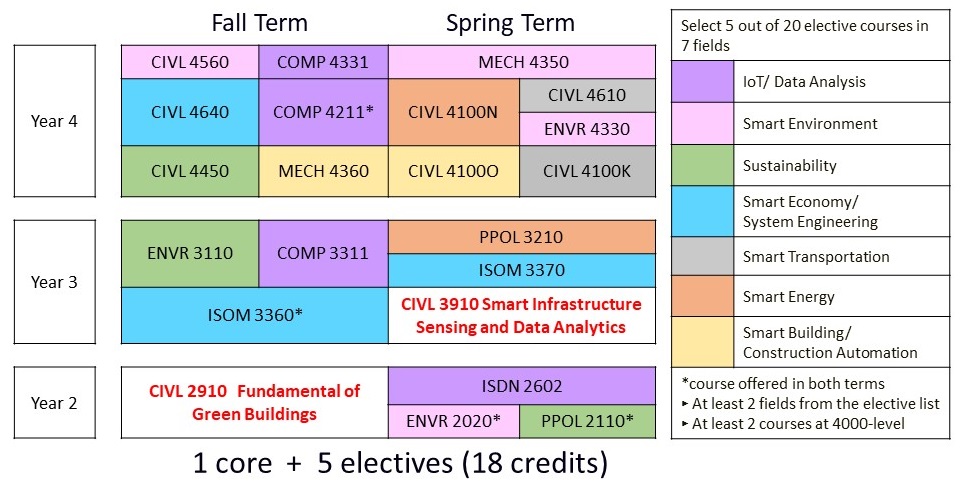Minor Programs
Minor Program in Smart City
Smart cities development is an emerging important research and development direction, both locally and internationally. This minor program will be comprised of a collection of courses covering various issues in smart city development. The domain of coverage includes theories, concepts, technologies and best practices of planning, building and developing smart cities. After taking this minor program, students will acquire fundamental principles and theories on smart cities and special knowledge fit for their own interests with an integration of practical knowledge, hands-on experience and student-centred learning activities.
There are many job openings related to smart city in Hong Kong and outside of Hong Kong, and therefore the Minor Program is designed to open to students in all majors. For non-engineering students, there are multiple study pathways to finish this minor program. The only required core course is CIVL2910, fundamental of green buildings, which help students of all majors understand the built environment and energy efficient design.

Program Entrance Requirements
The Minor Program in Smart City is designed mainly for engineering students, but also open to students in other majors. Any undergraduate students with an overall CGA of 2.7 or above may enroll in this Minor Program.
Students must declare their intention to enroll in the Minor Program no earlier than the first regular term of their second year of study, but no later than the last day of the add/drop period in the first regular term of their final year of study. Students who wish to withdraw from the Minor Program should apply before the last day of the add/drop period in the first regular term of their final year of study.
Curriculum
The program curriculum is available online (here).
Course Requirements
The Minor Program in Smart City requires a minimum of 18 credits to be taken from the following courses:

Notes:
1. Course(s) taken as required course(s) of the major program may not be counted towards this elective requirement.
2. For credit transfer, students can transfer a maximum total of 6 credits to the Minor Program.
3. For students admitted in 2012-13 and after, at least 9 credits out of the total credits required by the minor program should be single-counted within the minor and are not used to fulfil any other requirements for graduation except the 120-credit degree requirement. For those admitted prior to 2012-13, the minimum number of single-counted credits would be 6.
4. To graduate with a minor in Smart City, students must be enrolled in the minor program and complete all of its requirements, as well as all the requirements of their major program of study; and attain an average grade point of at least 2.5 in course taken within the minor program.
5. CIVL 3910 is a new course to take effect in Spring, 2022-23
ISDN 2602: This is a new course subject to approval.
Career Prospects
The trend of needing greater appreciation of smart city development at all business corporations, industries, and governments will generate high demand for people with good understanding of the issue. Students who graduate with this minor or take some of the courses offered in this program will have wider career opportunities, and are expected to be taking leadership in dealing with issues related to the smart city development.
Minor Program in Environmental Sustainability and Management
This minor program will be comprised of a collection of courses covering various issues in environmental sustainability and management. The domain of coverage of the minor program includes air-, hydro-, and geo- environment. At present, the main focuses of the program are placed on sustainability and management of (1) air quality; (2) surface and ground water resources; and (3) water and solid waste treatment and utilization. Climate change and its effects on natural hazards and environment are also an important element of the program. It is anticipated that the future scope of the program curriculum will be expanded to cover natural resources and land use; coastal marine environment due to wastewater disposal; and construction of mega-cities & livability.
As environmental concerns are becoming increasingly important in Hong Kong and Mainland China, an improved knowledge and awareness of environmental sustainability issues is becoming a necessity for professionals, managers as well as policy makers in all disciplines. The program is designed for students from all Schools of HKUST. Through this program, we hope to provide students with fundamental and in-depth understanding of environmental sustainability and management that can certainly benefit them in their future career development and well-being of our living environments.


Program Entrance Requirements
Any undergraduate students with a CGA of 2.15 or above may enroll in this minor program. A background in basic chemistry would be beneficial to students' study but not essential for admission. Typically, students need three regular terms to finish this minor program. Students must declare their intention to enroll in the minor program no earlier than the second regular term of their first year of study but no later than the last day of the add/drop period in the second regular term of their penultimate year of study. Special approval should be obtained from the program coordinator for declaration made later than the enrollment window. Students who wish to withdraw from the minor program should apply before the last day of add/drop period in the last regular term of their study.
Curriculum
The program curriculum is available online (here).
Course Requirements
The Minor Program in Environmental Sustainability and Management requires a minimum of 18 credits to be taken from the following courses:
| Required courses | Credit(s) | |
|---|---|---|
|
(1) CIVL 1140 or (1) CENG 1700 |
Environmental Quality Control and Improvement
Introduction to Environmental Engineering |
3
3 |
| (1) CIVL 4430 | Environmental Impact Assessment |
3 |
Elective courses
| Elective types | Minimum number of courses | Minimum total credits | |||
|---|---|---|---|---|---|
| (2) ENGG | Environmental Sustainability and Management Elective | 4 | 12 | ||
Notes:
1. Students are recommended to take CIVL 1140 or CENG 1700 first to obtain the basic knowledge of this area prior to taking CIVL 4430.
2. Students should take 4 courses (12 credits) from the following list:
CIVL 2510/CENG 2220/MECH 2210, CIVL 1170, CIVL 3420, CIVL 4460, CIVL 4470, CIVL 4520, CENG 3210, CENG 4140, CENG 4710, MECH 4350, LIFS 1030, PHYS 1003.
No more than one course within the same course groups of CIVL 2510/CENG 2220/MECH 2210 can be counted towards the elective requirement.
For credit transfer, students can transfer a maximum total of 6 credits to the Minor Program.
For students admitted in 2012-13 and after, at least 9 credits out of the total credits required by the minor program should be single-counted within the minor and are not used to fulfill any other requirements for graduation except the 120-credit degree requirement. For those admitted prior to 2012-13, the minimum number of single-counted credits would be 6.
To graduate with a minor in Environmental Sustainability and Management, the students must have enrolled in the minor program and complete all of its requirements, as well as all the requirements of their major program of study; and attain an average grade point of at least 2.15 in course taken within the minor program.
Career Prospects
The trend of needing greater appreciation of environmental issues at all business corporations, industries, and governments will generate high demand for people with good understanding of these issues. This is particularly important for the Mainland China, where fast economic growth is coupled with rapid environment deterioration and low level of environmental efficiencies. Students whom graduate with this minor or take some of the courses offered in this program will have wider career opportunities, and are expected to be taking leadership in dealing with issues related to the environment sustainability and management.